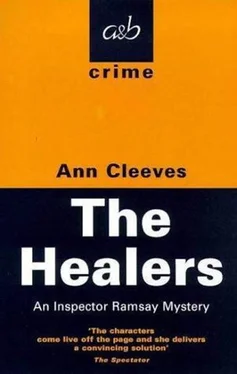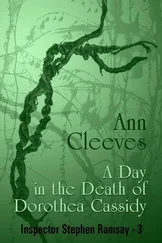Ann Cleeves - The Healers
Здесь есть возможность читать онлайн «Ann Cleeves - The Healers» весь текст электронной книги совершенно бесплатно (целиком полную версию без сокращений). В некоторых случаях можно слушать аудио, скачать через торрент в формате fb2 и присутствует краткое содержание. Жанр: Детектив, на английском языке. Описание произведения, (предисловие) а так же отзывы посетителей доступны на портале библиотеки ЛибКат.
- Название:The Healers
- Автор:
- Жанр:
- Год:неизвестен
- ISBN:нет данных
- Рейтинг книги:5 / 5. Голосов: 1
-
Избранное:Добавить в избранное
- Отзывы:
-
Ваша оценка:
- 100
- 1
- 2
- 3
- 4
- 5
The Healers: краткое содержание, описание и аннотация
Предлагаем к чтению аннотацию, описание, краткое содержание или предисловие (зависит от того, что написал сам автор книги «The Healers»). Если вы не нашли необходимую информацию о книге — напишите в комментариях, мы постараемся отыскать её.
The Healers — читать онлайн бесплатно полную книгу (весь текст) целиком
Ниже представлен текст книги, разбитый по страницам. Система сохранения места последней прочитанной страницы, позволяет с удобством читать онлайн бесплатно книгу «The Healers», без необходимости каждый раз заново искать на чём Вы остановились. Поставьте закладку, и сможете в любой момент перейти на страницу, на которой закончили чтение.
Интервал:
Закладка:
More money for old rope, Hunter thought again.
“Who was Mrs. McDougal paired with?” Ramsay asked.
“Lily Jackman,” Magda said.
“Who was the facilitator?”
“Both of them. They took it in turns.”
“Did Mrs. McDougal seem especially distressed or upset?”
“She became emotional, but that was to be expected.”
“But you don’t know what emerged from the session?”
“No, Inspector. You’d have to ask Lily.”
There was a brief silence.
“What were you doing on Saturday evening, Mrs. Pocock?”
“I was here,” she said. “In my flat upstairs.” She paused. “Val was here too. I’d invited her for supper.”
“Why?” Ramsay asked sharply. This, at least, was one gap filled. They knew now where Val had disappeared to on Saturday evening.
“Why, Inspector? Because we were friends. I wanted to spend some time with her.”
“Did you meet her regularly?”
“No,” Magda said. “This was the first occasion I’d invited her for a meal.”
“How did she seem?”
“Relaxed,” Magda said. “More relaxed than I’d ever known her.”
“What time did she leave?”
“At about eleven.”
“She wouldn’t have had to drive past Laverock Farm to go home?”
“Not usually. But it was a pleasant evening. It’s possible, I suppose, that she took that road.”
And she might have seen something, Ramsay thought. The time would fit. Perhaps she passed a car she recognized.
“Where were you on Monday evening?” he asked.
“In my flat,” she said. “On my own. Preparing my speech for the Nottingham conference.”
There was a pause. Hunter was beginning to get restless. This talk was getting them nowhere.
“Did you know that Cissie Bowles had left Laverock Farm to you in the event of Ernie not marrying?” he demanded.
“Daniel had mentioned it.”
“And were you aware that Mr. Bowles had taken steps to find a wife? He’d gone as far as consulting a dating agency.”
“No,” she said. “How could I know that? I had no social contact with the man.”
“Rather a coincidence, don’t you think?” Hunter sneered.
“That’s insulting, Sergeant.”
“Have you done a deal with Mr. Richardson at Long Edge Farm to sell him the land?”
“Of course not!” She seemed genuinely shocked. “It’s not even been discussed.”
“You might not have discussed it,” Hunter said. “But someone has. Peter Richardson was full of it last night.”
“No. There must be some mistake. Unless…”
“Unless?” Ramsay prompted gently.
“Unless Daniel has begun some preliminary negotiations,” she said frostily. Again Ramsay sensed her antipathy for her son-in-law.
“But you would be glad of the use of the farmhouse,” Ramsay said. “It would be more convenient than going to Juniper Hall for your weekend courses.”
“Yes, yes.” She was impatient and suddenly eager to be rid of them. “If that’s all,” she said, “I’ll see you downstairs.”
Chapter Sixteen
Charles McDougal made no attempt to cook a family lunch that Sunday, though Richard, the older son, was home from university for the weekend. Instead he mumbled something about having work to do and disappeared to spend the day with Heather. Perhaps he had intended to cook one of his elaborate meals for her. Heather had become altogether kinder and more solicitous since Val’s death, though whether this was because she was genuinely sympathetic, or because there was the possibility now that the relationship might become permanent and respectable, it was hard to tell.
The boys, Richard and James, were left to their own devices in the house where their mother had been killed. They had never been close and found now that they had little to say to each other. Richard, secretly, had thought for a long time that James was weird. All that New Age crap was a joke. Richard wanted to save the planet, too, but didn’t believe it could be done with crystals in pyramids and astrological charts. He’d thought James had grown out of it. When he’d asked his mother, that’s what she’d said. But his mother had been part of the problem and it seemed to Richard that they’d egged each other on, daring each other to accept greater follies, more bizarre ways of looking at the world. In the end he’d dismissed them both as potty and couldn’t blame his father for looking for other women.
When Charles disappeared to Newcastle to be comforted by Heather, Richard suggested that the two of them should go into Otterbridge, spend the day together. There were a couple of pubs he knew where you could drink all afternoon. He thought after a couple of pints he might get through to James. He felt a sort of responsibility for him. He blamed that crazy girlfriend James had taken up with last summer. Before that he’d been almost normal. A bit shy, a bit intense, but not cracked. If he could get James to talk about her, Richard thought in a muddled, good-natured way, it might help him come to terms with his mother’s death. He could see that Val’s murder had affected James in a strange way. There seemed to be little grief, but an empty detachment. Richard, who had howled like a baby when he’d first heard, couldn’t understand it.
“Come for a drink,” he said. “The Shakespeare does food. And there’s a good juke box.”
“Go by yourself,” James said, quite abruptly. “You’ll want to see your friends and they won’t like me hanging around.”
So Richard had gone, quite relieved in the end not to have to spend any more time with James. He’d never been one for navel gazing. It embarrassed him. He went into town where he met some friends he’d played rugby with when he was at school. They’d heard about his mother and knew just what he needed. When he’d drunk so much that he was insensible they took him home in a taxi, let themselves into the house with his key and put him carefully to bed.
There was nobody in the house when Richard came home. James left almost immediately after his brother, only making sure that the street was clear before he went out. He walked through the suburban streets, with their smells of roasting beef and over-cooked vegetables, into the town centre. Then he took the main road out of the town which led eventually to the coast. He stopped only once, at a petrol filling station which had a shop attached and which sold cut flowers. He took three large bunches from the tin bucket and paid with a ten pound note. The ten pounds he had stolen from his father’s wallet early that morning. His father would have given him the money if he had asked for it but stealing it was far more satisfying.
The cemetery was huge, bounded by a grey stone wall which stretched for almost a mile along the road. The entrance was marked by Victorian Gothic towers, and a flower seller stood there, a hard-faced, middle-aged woman with dyed blond hair tied up on the top of her head like the plume on a circus pony. James never bought his flowers from her, not only because he found her unsympathetic but because there was something shabby and unprepared in getting them at the last moment. There must be hundreds of regular visitors to the cemetery but he had the sense that she recognized him and he felt her dislike as he walked past her with the flowers he had already purchased in his arms.
His mother would not be buried here. Charles had decided already that she would be cremated. The funeral had been arranged for the following week. By that time the police would be prepared to release the body. It would be a dignified affair but there would be quite a show. The Vice-Chancellor of the university had agreed to read the address.
James always took the same path to the grave, though there were many that he could have chosen. He avoided the main track which cut the cemetery in half and which was busy with people who seemed to have no real reverence for the place families with children who dropped sweet papers and played kiss chase around the graves nearest to the track. Once, James had even seen a jogger die. A woman in black shiny cycle shorts and a sleeveless vest.
Читать дальшеИнтервал:
Закладка:
Похожие книги на «The Healers»
Представляем Вашему вниманию похожие книги на «The Healers» списком для выбора. Мы отобрали схожую по названию и смыслу литературу в надежде предоставить читателям больше вариантов отыскать новые, интересные, ещё непрочитанные произведения.
Обсуждение, отзывы о книге «The Healers» и просто собственные мнения читателей. Оставьте ваши комментарии, напишите, что Вы думаете о произведении, его смысле или главных героях. Укажите что конкретно понравилось, а что нет, и почему Вы так считаете.












